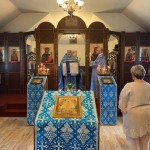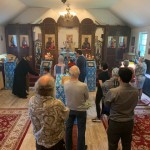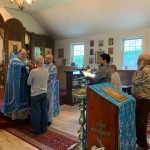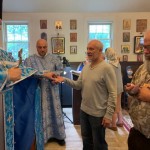On September 13, on the 14th Sunday after Pentecost, feast of the Placing of the Precious Cincture of the Most Holy Mother of God, we had a beautiful celebration in our parish. Rector of St. George Church, Archpriest Igor Tarasov served the Divine Liturgy. A ROCOR cleric, Priest Nenad Flora was present praying in the temple and receiving Holy Communion in the sanctuary. After the Gospel lesson the Rector preached the following homily:
“Dear Father, dear brothers and sisters! On this Sunday again we hear a parable told by our Lord Jesus Christ to His opponents. In a similar way, it is a parable about the Kingdom of heaven. Last Sunday Jesus compared God to a landowner who planted a vineyard, and the people to the vinedressers or tenants. Today’s story compares God to a king who prepared a wedding feast for his son. Let us look closely unto that parable”.
“God desired to invite man to His heavenly Kingdom, to return him to paradise. For that reason God sent His Only-begotten Son to redeem the human race. His Son is a Bridegroom who is going to unite in a mystical way with humanity, with His Bride, the Church”.
“At first, the wedding banquet of God’s Son was prepared for the chosen people, for the Jews. Today’s Gospel lesson says that the king sent his servants to call “those who were invited to the wedding” (Mt. 22, 3). The servants here are the Prophets whom God was sending to His people. But those who were invited, as we hear in today’s Gospel, disregarded the invitation or even mistreated the king’s servants (Mt. 22, 5-6). Same was done by the Jews to God’s Prophets. Then the king commands his servants to go to the highways and invite totally different people to the wedding (Mt. 22, 8). In this way the Holy Gospel proclaims the transfer of the Kingdom of God from Jews to Gentiles. If the Jews, the chosen people, the people who were invited to God’s joyful feast, became unworthy of that generous invitation, other nations should fill the banquet hall of the King’s celebration”.
“Through holy Sacraments of Baptism and Chrismation we are brought into union with Christ. Through those holy Mysteries we are brought into marriage with the Lord, the mystical marriage of the Church with her heavenly Bridegroom, the Christ. However, being invited, even for us, does not mean an automatic stay in the wedding hall. Today’s Gospel tells us about a man who came to the marriage banquet without a proper wedding garment. He was cast out of the hall (Mt. 22, 11-13). The wedding garment, dear brethren, is the grace of God which has to be put on. For as many of us were baptized into Christ, have put in Christ (Gal. 3, 27). In the times of Jesus, a special wedding garment was given for each guest at the wedding. The host provided such garments for the guests. This is why, it was strange to see a guest who did not have a wedding garment put on. In today’s parable the king saw a man without it and asked how could he enter without a proper dress. The guest was speechless (Mt. 22, 12). In the same way, many people who became baptized lose or refuse to put on the garment of divine grace, the garment of pure and pious life. They avoid spiritual life, they refuse to attend the church, they decline reception of the Sacraments. All these things, like a wedding garment, are provided by God for us. But many of us refuse to take it. And when the Lord comes and demands an answer, we become speechless. We have nothing to say”.
“This is the spiritual understanding of what it means to put on the proper dress for the wedding banquet; it is the most important one. But there may be a literal sense of those words about the wedding garment, about the proper dress. That sense concerns the way how we dress when we come to the temple. Of course, our pure heart and our enlightened soul is the most important. However, the way we dress our body should also be considered. Some of us come to the church dressed like for a work in the garden, dressed rather casually or inappropriately. Such attitude should be avoided because it is a sign of disrespect towards the Church, towards the community and also towards the Lord Jesus. Some pastors would not care and even preach that it is not important how you are dressed for the church services, as long as you come and as long as you have a pure heart. But that’s not the way we should think. Everything is important when you go to the church – our pure heart, as well as our neat and proper clothes”.
“Dear Father, dear brother and sisters! Hearing the parable about a wedding feast, let us be worthy of God’s invitation. Let us come joyfully to the Lord, let us attend His holy wedding. For us, every Divine Liturgy is such a wedding banquet. Let us not miss it. Let us avoid the attitude of those who declined the king’s invitation. And let us not forget to be appropriately dressed for this important occasion. Our appropriate dress, our wedding garment is our pure soul, a heart cleansed of all impurity in the holy Sacrament of confession. It is also our dress in a literal sense, our appropriate appearance in the temple. Let us not become speechless and then cast out into the outer darkness, but come into joy of our Lord and feast with Him in the everlasting joy of His Heavenly Kingdom!”
During the Litany of Fervent Supplication, Fr. Igor proclaimed a petition beseeching the Lord to spare the faithful from the outbreak of the disease.
The choir prayerfully performed hymns dedicated to the Most Holy Mother of God during preparation for Holy Communion.
After the dismissal of the Liturgy the Rector preached a short sermon in Russian conveying the ideas of his English sermon. He also mentioned the feast of the Placing of the Precious Cincture of the Most Holy Mother of God we celebrated. Fr. Igor pointed out that the cincture, the belt of the Most Holy Theotokos was a part of Her garments. It is venerated as a relic. Thus today speaking of the proper garment mentioned in the Gospel lesson we should note that the Mother of God dressed appropriately; Her holy life was also manifested in Her proper dress, so Her clothes are revered today. Thus, understanding the concept of the wedding garment from the Gospel parable in a spiritual way (as the divine grace clothing our soul) we should also remember to dress appropriately for the church services.
At the conclusion of his speech the Rector greeted Moses Dunetz and Alexander Yakovlev on their past name days dividing the Theotokian prosphora among them and proclaiming the traditional Polychronion on their behalf.




